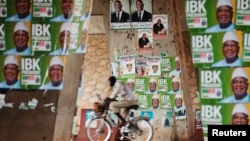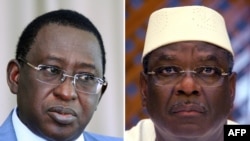BAMAKO —
Malians are going to the polls Sunday for a presidential run-off election that will decide who leads the country out of 18 months of unprecedented conflict and political crisis. The final round of campaigning was relatively quiet, in part due to the Eid al-Fitr holiday period.
It was a sleepy end to a 48-hour campaign run for the two candidates, former Prime Minister Ibrahim Boubacar Keita and former Finance Minister Soumaila Cisse.
The Constitutional Court did not confirm results of last month's first round of voting until Wednesday, eve of the major Muslim holiday celebrating the end of the holy month of Ramadan, so religion took priority over politics.
Results indicate Keita dominated the first round of voting with nearly 40 percent of the vote, while Cisse pulled just under 20 percent. Since the July 28 polls, most of the 25 other candidates eliminated in the first round have thrown their support to Keita, including the third place finisher Dramane Dembele.
It was not until Friday evening that caravans of cheering young people on the streets of Bamako announced that the campaign was, at last, on.
Young men, all wearing T-shirts showing their support for Cisse, rolled up to a rally of less than a thousand people.
A youth leader for Cisse's URD party, Moussa Coulibaly, attached an impromptu campaign signboard to a stage, a piece of cardboard with small political fliers of the four parties backing Cisse in the run-off.
The election, the country's first since 2007, is seen as crucial to unlocking nearly $4 billion in promised international aid that was suspended after a military coup last year plunged the country into chaos. The question on the minds of many voters, however, is whether Cisse's support base will be strong enough to propel him past Keita, who has 20 of the 28 first-round candidates backing him, in the run-off.
"Yes, it is enough. We are confident," says Coulibaly. "We have done a lot of mobilization to get voters on our side. We showed them what Soumaila has done and what he wants to do as president."
Keita and Cisse served together in a government in the 1990s, but ended up in opposing camps following the 2002 presidential win by Amadou Toumani Toure, who was overthrown last year in the military uprising. In the chaos that followed, ethnic Tuareg separatists seized towns and cities in Mali's northern desert, with the help of several Islamist groups.
Both in their 60's and long-time fixtures on Mali's political scene, Cisse and Keita, their supporters say, could not be more different.
Cisse, a technocrat from the north, has run a campaign focused on economic recovery, while Keita, the one-time prime minister and former National Assembly president from the south, has focused on restoring Mali's honor and military strength.
Unlike Cisse, Keita did not make any public campaign appearances. His team cancelled a stadium rally planned for Friday, citing security concerns, though they did not elaborate.
A United Nations peacekeeping force of 12,000 troops began providing national security in July, as the last of French forces that earlier this year pushed Islamist groups back into desert areas, continued preparations to leave the country by the end of the year.
Supporters of both men say they are focusing on getting people to actually go out and vote Sunday.
Two dozen women from Keita's RPM party and other allied parties met at party headquarters Friday to retrieve the sample ballots they will use to show people how to firmly place their finger print in the square below the candidate's photo.
Authorities said nearly 400,000 ballots were cast incorrectly during the first round of the election, and so were not counted.
RPM women's leader Aissata Toure says there was not much time for campaigning before the runoff, but she is not worried. "Our candidate is more than visible, and we have voters aplenty," she says, adding that the choice before the voters "is bigger than just our party — it is the Malian people who back our candidate."
The first round saw a record voter turnout of 49 percent. Voting was calm despite concerns of attacks or instability in the formerly rebel- and Islamist-held north.
Amadou Maiga contributed reporting from Bamako; some information was provided by AP and AFP.
It was a sleepy end to a 48-hour campaign run for the two candidates, former Prime Minister Ibrahim Boubacar Keita and former Finance Minister Soumaila Cisse.
The Constitutional Court did not confirm results of last month's first round of voting until Wednesday, eve of the major Muslim holiday celebrating the end of the holy month of Ramadan, so religion took priority over politics.
Results indicate Keita dominated the first round of voting with nearly 40 percent of the vote, while Cisse pulled just under 20 percent. Since the July 28 polls, most of the 25 other candidates eliminated in the first round have thrown their support to Keita, including the third place finisher Dramane Dembele.
It was not until Friday evening that caravans of cheering young people on the streets of Bamako announced that the campaign was, at last, on.
Young men, all wearing T-shirts showing their support for Cisse, rolled up to a rally of less than a thousand people.
A youth leader for Cisse's URD party, Moussa Coulibaly, attached an impromptu campaign signboard to a stage, a piece of cardboard with small political fliers of the four parties backing Cisse in the run-off.
The election, the country's first since 2007, is seen as crucial to unlocking nearly $4 billion in promised international aid that was suspended after a military coup last year plunged the country into chaos. The question on the minds of many voters, however, is whether Cisse's support base will be strong enough to propel him past Keita, who has 20 of the 28 first-round candidates backing him, in the run-off.
"Yes, it is enough. We are confident," says Coulibaly. "We have done a lot of mobilization to get voters on our side. We showed them what Soumaila has done and what he wants to do as president."
Keita and Cisse served together in a government in the 1990s, but ended up in opposing camps following the 2002 presidential win by Amadou Toumani Toure, who was overthrown last year in the military uprising. In the chaos that followed, ethnic Tuareg separatists seized towns and cities in Mali's northern desert, with the help of several Islamist groups.
Both in their 60's and long-time fixtures on Mali's political scene, Cisse and Keita, their supporters say, could not be more different.
Cisse, a technocrat from the north, has run a campaign focused on economic recovery, while Keita, the one-time prime minister and former National Assembly president from the south, has focused on restoring Mali's honor and military strength.
Unlike Cisse, Keita did not make any public campaign appearances. His team cancelled a stadium rally planned for Friday, citing security concerns, though they did not elaborate.
A United Nations peacekeeping force of 12,000 troops began providing national security in July, as the last of French forces that earlier this year pushed Islamist groups back into desert areas, continued preparations to leave the country by the end of the year.
Supporters of both men say they are focusing on getting people to actually go out and vote Sunday.
Two dozen women from Keita's RPM party and other allied parties met at party headquarters Friday to retrieve the sample ballots they will use to show people how to firmly place their finger print in the square below the candidate's photo.
Authorities said nearly 400,000 ballots were cast incorrectly during the first round of the election, and so were not counted.
RPM women's leader Aissata Toure says there was not much time for campaigning before the runoff, but she is not worried. "Our candidate is more than visible, and we have voters aplenty," she says, adding that the choice before the voters "is bigger than just our party — it is the Malian people who back our candidate."
The first round saw a record voter turnout of 49 percent. Voting was calm despite concerns of attacks or instability in the formerly rebel- and Islamist-held north.
Amadou Maiga contributed reporting from Bamako; some information was provided by AP and AFP.








